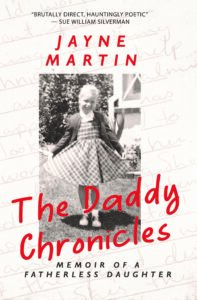“Memory is like shards of glass from a broken mirror where pieces have gone missing. Not only does it present a distorted image, the edges are sharp and can draw blood,” (Martin 2022) writes Jayne Martin looking back on her own memoir, The Daddy Chronicles. Martin pieces together her memoir in a series of linked cinematic vignettes or what feels like prose poems. This series tells her life story, a life longing for her father to open his arms to her. Each chapter delivers a meditation on the primal desire for wholeness and the cost of unmet hunger for the attention and affection of an absent father.

As many as twenty-five percent of children in the US live in a household without a father (United States Census Bureau 2021). One out of three women identify as fatherless; either through death, divorce, abandonment or a father that may be physically present, but emotionally absent (Martin 2022). Children in father-absent homes are four times more likely to be poor, and children in single-parent homes are more than twice as likely to commit suicide (NPR 2017). The statistics go on, they are staggering.
Martin’s experience of growing up fatherless is all too common but she presents a fragile yet relatable face onto the reality of our national domestic tragedies. Martin draws on her own deepest feelings and pivotal memories; she shows the results of a fatherless child growing into an emotionally unavailable young adult who seeks out the same unavailability in relationships. However, The Daddy Chronicles makes no claim to any reality other than Martin’s own feelings and memories, which she succinctly lays bare on the brief pages of her memoir.
“You knew he wasn’t a family man when you married him,” my grandmother says to my mother. But she is looking at me. And though I don’t know what “family man” means, I see Mommy turn her head to hide her tears.”
Martin’s father remains just out of reach for her: as if in a dream where Martin can’t quite make it to his open arms before waking up in a soaked bed; or like a baby crying out for her father’s attention only to have the father respond by turning up the television loud enough to drown out the cries; or like the teenaged a girl who drinks to the point of vomitus so that she may appear fun and appealing to college-aged boys; or even in later years the woman dressed for seduction who cooks a meal she cannot afford only to be stood up by her married lover. All these scenes appear in The Daddy Chronicles, played by the same woman. One begins to wonder how many heartbreaks Martin can endure but, on every page, she proves she is a survivor.
Original and honest, The Daddy Chronicles takes risks in delivering these loosely connected, blunt force vignettes with little context or commentary. That risk pays off. Martin has published a memoir that’s as necessary to read as it was for her to write. ◆